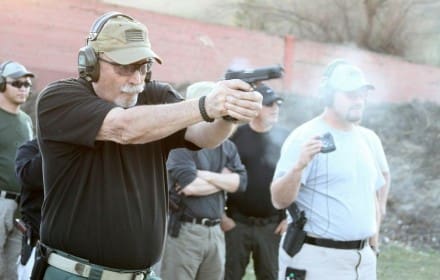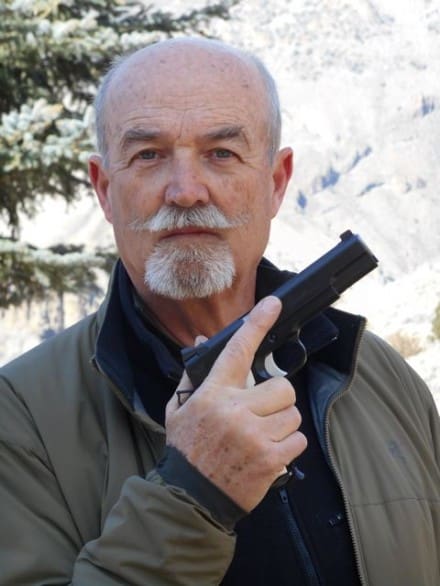If you follow any of the internet forums you will see the argument of whether competition shooting is a plus or minus for ‘Real World’ application. The ‘ game boys’ will argue that competition is the key to success, and the ‘tactical gurus’ promise that gun games will doom you to the flames of Hell. The truth falls somewhere in the middle. First of all, I will make it clear that I am not anti-gun competition. I was a founding member of IPSC, IDPA, and the guy that started three-gun competition in the USA. I have been active in all three, never a ‘great shooter’, but a pretty ‘good’ one back in the day.
Gun games will definitely produce highly skilled shooters. In my classes over past 35 years I have noted that typically the best shooters have come action shooting backgrounds. I think that those shooters who have subjected themselves to the stress of shooting in competition have certainly learned some important lessons about how well they perform when out of their comfort zone. Gun handling, quick accurate shooting, and movement with a weapon are skills that can be mastered via gun games. To bad mouth gun games as not realistic or valid for developing combat marksmanship skills is not wise.
Look at the number of top trainers with Alias Training and you will find most have a gun game history. Jim Cirrillo was one of the top gun fighters of his era…he was also a PPC champ and always said that his competition background was a key to his success in his many shootouts. So, gun games have benefits…..Right. But, they also have some real negatives. If you pursuethem to become really good in your particular discipline, you will have to adopt techniques and practices that can be harmful in the real world. Like everything we do in life…….you are what you practice. The more you practice, the more it becomes subconscious.
Case in point: I had a nice young man in a class recently that was very skilled. He was an active USPSA competitor and very quick and accurate. Every time his relay would finish their drills, he would quickly unload and holster his pistol ( magazine out, slide quickly to the rear and catch the ejected round in his hand). Even though I told each relay to top off their weapons and then holster prior to scoring and pasting targets…He did this every time, and was never ready to shoot when his relay was called to the line the next time. Later in the day as his relay finished and everyone else was reloading and holstering, he was still clearing and unloading his pistol. I finally walked over and asked him, “Why in the Hell do you keep unloading your sidearm when you are finished with a shooting task?” He got red in the face, and then answered ‘habit’. Well, now we can see the negatives of gun games and the many things that you will program as a reflexive response. There are a whole host of things that the well seasoned game boys do that are pure stupid in the real world. Yea, I know that most will tell you that I would not ‘do that’ if it were for real. Ray Charles could a see how bogus that statement is. Remember, you are what you practice. I note that many of the top gun game boys really think that because They are so good and fast on the trigger that in the real world they will automatically win any encounter with the bad guys…..yea, I had a dose of that mindset myself back in the day.
Understand what the good and bad of gun games bring to the table. They are great fun, I recommend that anyone that carries a blaster give them a try, but don’t become a slave to them.
-Ken Hackathorn
Ken Hackathorn has served as a US Army Special Forces Small Arms Instructor, Gunsite Instructor, and NRA Police Firearms Instructor. He is currently an FBI Certified Firearms Instructor, Certified Deputy Sheriff with Washington County SO, Ohio, and a SRT member and Special Response Team trainer. Ken has trained US Military Special Operations forces, Marine FAST and SOTG units and is a contract small arms trainer to FBI SWAT and HRT.
Ken has provided training to Federal, State, and local law enforcement agencies and been active in small arms training for the past 25 years. He has written firearms related material for Guns & Ammo, Combat Handguns, Soldier Of Fortune, and currently American Handgunner and contributed to at least six other gun/shooting journals. Ken was also a founding member of IPSC and IDPA.
To see Ken’s Training Class Schedule visit aliastraining.com.
Gunfighter Moment is a weekly feature brought to you by Alias Training & Security Services. Each week Alias brings us a different Trainer and in turn they offer SSD readers hard earned words of wisdom.
Tags: Alias Security and Training Services, Gunfighter Moment, Ken Hackathorn




Some true words in this piece. Here is a news flash for the scoffers. Active war or not, you can’t rely on getting in a real world gun fight every couple of weeks for your training and standing on the square range or running the shoot house doesn’t cut it. The stress/adrenaline dump of running a course with a bunch of onlookers is some of the best training you can get. If you are serious about your gunfighter skills, get out to some type of match every month or two and you will be amazed at the improvement.
I think you kinda missed the point of the article. He’s saying that gun games have their uses and are helpful in some areas but do build bad habits. Basically, get the most out of certain aspects of them but be careful of how they affect your shooting.
You’re both right. Comp shooting is great for learning to become comfortable with uncomfortable situations (shooting under stress in courses of fire you’ve never seen before), refining weapon manipulationss, testing your weaknesses (single hand, weak hand, awkward positions, distance shots under pressure) and pushing your limits. It is not tactics training, so just don’t mistake the two.
To hear Ken say he was a “pretty good” shooter freaks me out a little bit having done 4 days of training with him. Operating on less than 4hrs sleep and using a borrowed G19 he outshot most of the shooters in the class with little to no effort. Same thing happened during the carbine course. I would have loved to have seen him shooting 20 years ago, I’m pretty sure he was even better back then. Pretty good my ass….
Ditto what Rob E posted. Ken is way beyond “pretty good”. He is one of the greats and a fountain of weaponcraft knowledge.
Sitting on Ken’s porch on Saturday nights before the Sunday Ft. Harmar IPSC matches are some of my fondest memories. Ken has always been incredibly generous in sharing his knowledge.
To the point of this article; Absolutely correct. Check your work through the sights, scan, top off, and then reluctantly holster.
Right on Rosco.I too have had the pleasure of learning formally and informally from Hack at Fort Harmar Rifle Club.Ken is one of those rare people with great tactical shooting skills who can also instruct others in these skills.I have retired from the same sheriffs office where Hack is the SRT trainer therefore have benefitted from knowing Hack for many years.If you attend one of his classes you will not be disappointed.
Ken is an absolute class act. In a class by himself in many different ways.
Ken makes some good points but, unless your in some SF unit training all the time IPSC/USPSA, 3gun ect. is the best place for civilians to learn valuable skills. Remember, SEALs go to SHAWS in north Mississippi to do CQB training. Their instructors are current or former USPSA shooters.
I think you’re missing the point, if you do nothing but IPSC/IDPA/3Gun/etc., you will learn some bad habits that won’t fly in a real world situation. SEALs may got to SHAWS but that’s only to pick up pointers, not as an entire training platform. Civilians can easily take defensive training classes, they don’t have to only rely on “gaming” training. Personally, I do both and I tend to err more on the “defensive training” side rather than the “gaming” side. I don’t automatically clear my gun right after a run, I use cover as much as I can, etc., etc…sure, my times suffer but I’m not there for “gaming”, I’m there to use the venue for defensive training.